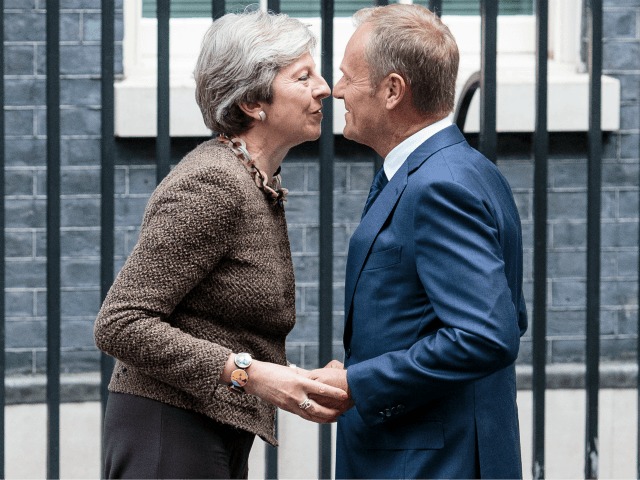BRUSSELS (AP) — European Union Council President Donald Tusk on Tuesday urged Britain to change its mind about leaving the bloc next year, as time to conclude a Brexit agreement runs short and EU leaders await more details on how the country sees their future ties.
Britain is set to leave the EU on March 29, 2019, but the complex negotiations on its costly departure and future EU-U.K. relations must be concluded by October to leave parliaments time to ratify any agreement.
British Prime Minister Theresa May has even asked for a transition period after Brexit day to give citizens certainty and help ease the country out of Europe without alarming financial markets or hurting businesses.
“If the U.K. government sticks to its decision to leave, Brexit will become a reality, with all its negative consequences, in March next year unless there is a change of heart among our British friends,” Tusk told EU lawmakers Tuesday in Strasbourg, France.
Tusk, who chairs summits of EU leaders and speaks on their behalf, quoted U.K. Brexit envoy David Davis as saying that “if a democracy cannot change its mind, it ceases to be a democracy.”
“We here on the continent haven’t had a change of heart. Our hearts are still open to you,” Tusk said.
European Commission President Jean-Claude Juncker added: “I hope that will be heard clearly in London.”
Brexit talks have progressed painfully slowly, and while the EU says it’s ready to discuss future ties with London, leaders are still seeking more details about how May’s government sees those links.
“What we need today is more clarity on the U.K.’s vision,” Tusk said. “”The hardest work is still ahead of us and time is limited.”
Manfred Weber, the leader of the European People’s Party group — the biggest in the EU parliament — said: “My message to London is: please don’t complain anymore. Please stop complaining. Please deliver. Give us an outlook about what you want to achieve for the future relationship.”
Negotiations are continuing on a transition period that would help ease Britain out. The EU is insisting on less than two years, until the end of 2020 — when the Union’s current long-term budget period ends.
According to the latest draft of Brexit negotiating guidelines, seen by The Associated Press, Britain would not be able to conclude a trade deal with any other country until that period is over “unless authorized to do so by the Union” during the transition. It would have to continue to obey all European regulations without having any say in the way this bloc of more than half a billion people is run.
“If you stay in the Union, in this transition period, it is for the whole 2 or 3 years that all the policies of the EU, all the legislation … will be applicable,” said the European Parliament’s Brexit point-man Guy Verhofstadt. “The only thing that will change is that Britain will not be represented anymore in the institutions.”
In London, meanwhile, U.K. Foreign Secretary Boris Johnson was defending a debunked claim that leaving the EU will save Britain 350 million pounds ($481 million) a week. In fact, Johnson says, the figure is too low.
The claim that “we send the EU 350 million pounds a week” was emblazoned on the side of a bus used by the “leave” campaign in Britain’s 2016 EU membership referendum. Britain’s statistics agency says the net amount the U.K. pays is closer to 180 million pounds per week.
But Johnson told The Guardian newspaper that the bus claim “grossly underestimated the sum over which we would be able to take back control.”
In an interview published Tuesday he said Britain’s gross contribution to the EU budget was 362 million pounds a week, and would rise to 438 million pounds a week by the end of any two-year transition period.
Britain’s financial obligations to the EU on departure could total some 50 billion euros ($59 billion).

COMMENTS
Please let us know if you're having issues with commenting.